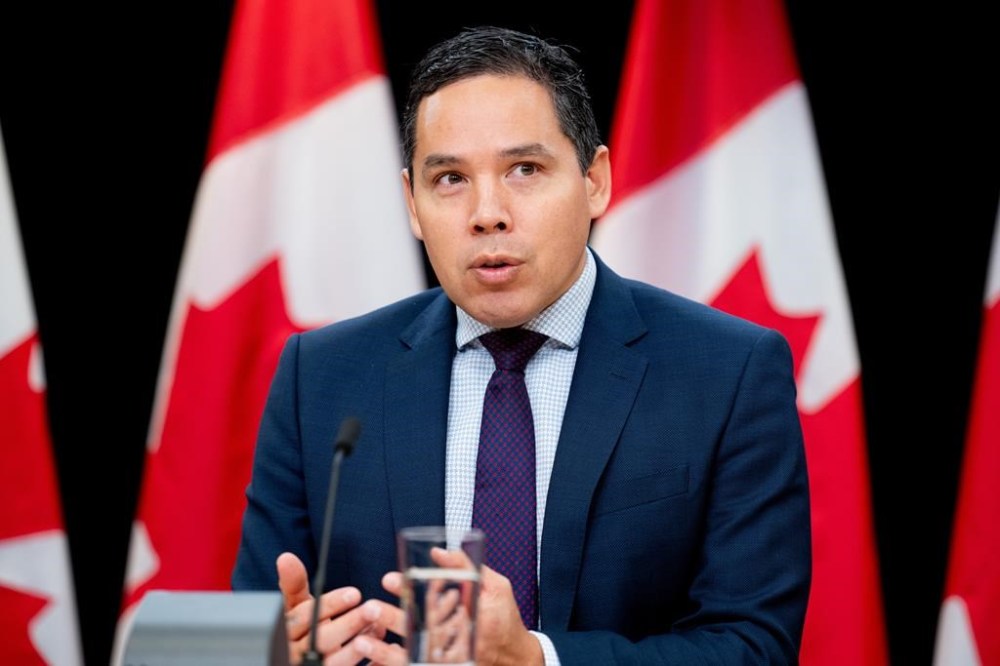Head of Inuit Tapiriit Kanatami accuses Labrador group of ‘co-opting’ Inuit identity
Advertisement
Read this article for free:
or
Already have an account? Log in here »
We need your support!
Local journalism needs your support!
As we navigate through unprecedented times, our journalists are working harder than ever to bring you the latest local updates to keep you safe and informed.
Now, more than ever, we need your support.
Starting at $15.99 plus taxes every four weeks you can access your Brandon Sun online and full access to all content as it appears on our website.
Subscribe Nowor call circulation directly at (204) 727-0527.
Your pledge helps to ensure we provide the news that matters most to your community!
To continue reading, please subscribe:
Add Brandon Sun access to your Winnipeg Free Press subscription for only
$1 for the first 4 weeks*
*$1 will be added to your next bill. After your 4 weeks access is complete your rate will increase by $4.99 a X percent off the regular rate.
Read unlimited articles for free today:
or
Already have an account? Log in here »
Hey there, time traveller!
This article was published 08/11/2023 (695 days ago), so information in it may no longer be current.
OTTAWA – The president of Inuit Tapiriit Kanatami is accusing an organization in Labrador of co-opting Inuit identities to secure lands, rights and financial resources.
Natan Obed argues that NunatuKavut Community Council, which represents some 6,000 people in south and central Labrador it claims to be Inuit, is advancing “illegitimate claims” of Indigenous identity.
Todd Russell, president of the NCC, is describing the allegations as “defamatory,” adding that ITK, the national organization for Inuit in Canada, has “no right” to determine the identity of the people his own group represents.

It is not the first time the NCC has faced questions about its claims.
The Innu Nation has asked the Federal Court to quash a 2019 agreement between the federal government and the council. That memorandum of understanding sets the guidelines for self-determination talks. The Inuit Nunatsiavut government in northern Labrador also does not recognize the council as an Inuit group.
The latest challenge came in an open letter to Canadians that Obed published Monday, in which he urged governments to guard against “the erosion of Indigenous rights and status” by refusing to recognize groups such as this one.
Obed noted the NCC used to refer to itself as the Labrador Métis Nation — a choice its website says it made decades ago when the makeup of representative Indigenous groups “was constantly in flux.”
“NCC is not an Inuit rights-holding organization,” Obed wrote in the Monday letter. He said it is also not affiliated with any of the four Inuit treaty organizations that developed the federal policy for Inuit Nunangat, which is the traditional Inuit territory in Canada.
“NCC is a shape-shifting non-Indigenous organization that is part of the alarming trend of non-Indigenous people and groups co-opting Indigenous identities, cultures, and experiences to secure financial resources and rights,” Obed wrote.
“Inuit are one people, and we share a common history, language, culture and way of life. We are bound to each other through this commonality and through our kinship and family ties,” he wrote.
“Inuit know who we are and where our people are in Canada and throughout the circumpolar world.”
Amy Hudson, the NCC’s chief governance officer, said Wednesday that despite a change in name, its people have never shifted who they are.
“Our people have not changed. Our bloodlines have not changed.”
In a statement posted online Monday, Russell said the letter from Obed is “filled with outrageous claims, outright lies and falsehoods.”
He also added the federal government has recognized the people his organization represents as Indigenous.
“Obed’s comments about ‘misappropriation of resources’ very clearly demonstrates the motivations behind ITK’s allegations about us — money,” Russell wrote.
“They have manufactured a fear that they will lose something as we progress.”
The NCC wants to reassure its people “that while the lies and innuendo being spread about us are hurtful and disheartening, it does not change who we are as Inuit or where we come from,” Russell wrote.
Obed said Wednesday one of the reasons he decided to release the letter this week is because the ITK passed a resolution at its annual general meeting last month rejecting the premise that the NCC has constitutional rights as Indigenous Peoples.
He had penned a similar letter to Prime Minister Justin Trudeau in 2021, calling on him to rethink the way the federal government engages with NCC. On Wednesday, Obed said ITK still remains largely in the dark about the federal government’s dealings with the group.
Joanna Sivasankaran, a spokeswoman for Crown-Indigenous Relations Minister Gary Anandasangaree, said in a written statement on Wednesday that the 2019 memorandum of understanding between the federal government and the NCC was meant to resolve questions about the rights that the organization holds.
The document did not “create, recognize or deny any legal or constitutional right or obligation on the part of either party,” she wrote.
“Recognition of Indigenous rights requires a rigorous examination. NunatuKavut is not receiving resources deemed for Inuit.”
This report by The Canadian Press was first published Nov. 8, 2023.
